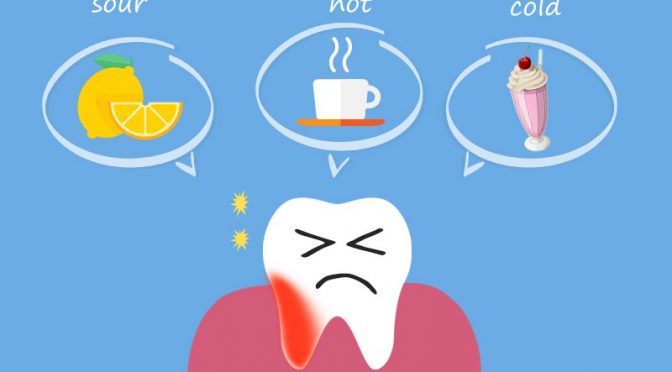A Sensitive Teeth Survival Guide

Tooth sensitivity is incredibly common in Australia, with 45 per cent of Australian households having someone who suffers from sensitive teeth or gums. If you’re one of these people and you often avoid eating hot or cold foods because of the discomfort they cause you, it could be time to talk to your dentist about the root of the problem and possible treatment methods.
What Causes Sensitive Teeth?
There are a number of conditions and lifestyle factors that can cause or increase the level of tooth sensitivity a person experiences.
A big factor that contributes to this discomfort is dentin hypersensitivity and nerve irritation. The inside of your teeth are primarily made up of dentin, which contains tiny tubules with microscopic nerve endings. The hard coating of enamel that covers the crown of your tooth usually protects this dentin, while a layer of cementum protects the dentin in the root of your tooth. When the dentin loses these protective coatings, the nerve endings inside your tooth become exposed to hot, acidic and cold foods, which can cause pain.
This sensitivity can be caused by a number of things, including but not limited to:
- Worn tooth enamel from over brushing or from using a particularly coarse toothbrush
- Tooth erosion that occurs when you have a diet filled with too much acidic food and drinks, like soft drink
- Tooth decay, worn fillings and broken teeth can also expose the dentin in your teeth and cause sensitivity
- Any gum recession that has left the root surface of your teeth exposed
- Grinding your teeth, especially at night when you sleep
- It’s also common for people to experience temporary sensitivity after standard dental treatments, like teeth whitening treatments and fillings
How Can You Find Relief From Your Sensitive Teeth?
The first step to relieving your discomfort is to talk to your dentist. Your dentist might be able to perform a procedure or treatment that will help relieve your pain or recommend products that you can use at home to decrease sensitivity.
For instance, if appropriate, your dentist might be able to apply a fluoride gel that will help strengthen the tooth enamel and decrease painful sensations. They might also recommend an over the counter desensitising toothpaste.
However, the best thing you can do for your teeth is to try and prevent your enamel wearing down in the first place, by following a good oral hygiene routine and having regular dental check-ups.
To get your dental habits into good shape, make an appointment with Advanced Dental Centre today!
Archives
- October 2018
- April 2018
- March 2018
- January 2018
- December 2017
- November 2017
- October 2017
- August 2017
- July 2017
- September 2016
- July 2016
- June 2016
- May 2016
- April 2016
- August 2015
- May 2015
- March 2015
Recent Posts
- Common Dental Problems In Adults
- A Sensitive Teeth Survival Guide
- Do You Suffer From Bad Breath?
- What is Sleep Apnea and How Can You Treat it?
- 4 Myths About Baby Teeth Busted







